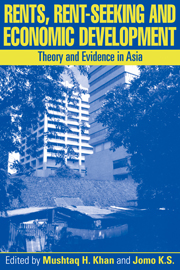Book contents
- Frontmatter
- Contents
- List of Figures
- List of Tables
- List of Contributors
- Acknowledgements
- List of Abbreviations
- Introduction
- 1 Rents, Efficiency and Growth
- 2 Rent-seeking as Process
- 3 Rent-seeking and Economic Development in Thailand
- 4 Thailand's Old Bureaucratic Polity and Its New Semi-democracy
- 5 Obstructive Corruption: The Politics of Privilege in the Philippines
- 6 Funny Money: Fiscal Policy, Rent-seeking and Economic Performance in Indonesia
- 7 The Malaysian Development Dilemma
- 8 Financial Sector Rents in Malaysia
- Index
8 - Financial Sector Rents in Malaysia
Published online by Cambridge University Press: 05 March 2012
- Frontmatter
- Contents
- List of Figures
- List of Tables
- List of Contributors
- Acknowledgements
- List of Abbreviations
- Introduction
- 1 Rents, Efficiency and Growth
- 2 Rent-seeking as Process
- 3 Rent-seeking and Economic Development in Thailand
- 4 Thailand's Old Bureaucratic Polity and Its New Semi-democracy
- 5 Obstructive Corruption: The Politics of Privilege in the Philippines
- 6 Funny Money: Fiscal Policy, Rent-seeking and Economic Performance in Indonesia
- 7 The Malaysian Development Dilemma
- 8 Financial Sector Rents in Malaysia
- Index
Summary
As the East Asian crisis swiftly unfolded from a currency crisis into a financial crisis in the second half of 1997, many commentators were quick to denounce East Asian style banking systems as the cause. In particular, it is claimed that government interventions had distorted these systems, resulting in unsound banking practices. Most importantly, it is claimed that crony capitalism was rooted in the banking systems, which deviated from neo-liberal Anglo-American norms. Thus, it is said, improper state–business relations were responsible for the crises that eventuated.
The popular neo-liberal interpretation of the East Asian crisis has largely ignored the possibility that international financial liberalization, especially since the 1980s, could have been a contributing factor. It largely ignores the disastrous impact of massive capital flight, especially from the region's newly emerging (stock) markets. The Kuala Lumpur Composite Index collapsed from a February 1997 high close to 1300 to an August 1998 low of 264 – that is, a drop of almost 80 per cent. Instead, the focus has largely been on the banking systems and practices in the region. For various reasons, the three most affected economies of Thailand, South Korea and Indonesia have all been much more bank-based than Malaysia, especially in recent years, when considerable disintermediation has occurred with the relative as well as absolute growth of the stock market.
Thus, currently popular interpretations of the East Asian crises largely reflect the ideas of proponents of financial liberalization, who have criticized the ‘financial repression’ said to be a consequence of government intervention and regulations in financial markets.
- Type
- Chapter
- Information
- Rents, Rent-Seeking and Economic DevelopmentTheory and Evidence in Asia, pp. 304 - 326Publisher: Cambridge University PressPrint publication year: 2000



